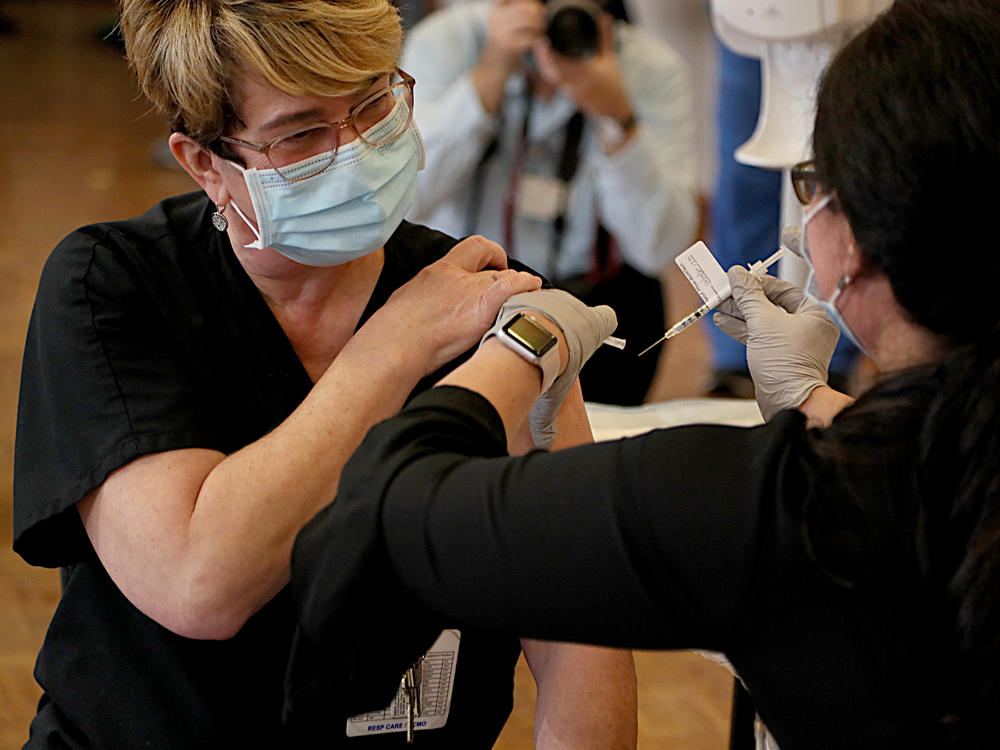Section Branding
Header Content
Millions More COVID-19 Vaccine Doses Are On The Way, U.S. Officials Say
Primary Content
At least 55 immunization sites across the U.S. received doses of Pfizer and BioNTech's long-awaited vaccine Monday morning, says Army Gen. Gustave Perna, chief operating officer of Operation Warp Speed. The effort to get the vaccine into medical professionals' hands, he said, has gone "incredibly well."
Perna credited a number of people for the success, from volunteers who helped to test the vaccine to those who worked over the weekend to prepare, ship and deliver the doses, which must be stored at very cold temperatures to remain viable.
The U.S. vaccine distribution network kicked into high gear over the weekend after the Food and Drug Administration granted an emergency use authorization late Friday. Vaccinations have now been reported in a number of states, including New York, Florida and Kentucky. Officials said it's just the start as they ramp up deliveries of the vaccine and await authorization for a second vaccine.
Health and Human Services Secretary Alex Azar said that by Wednesday, "the vaccine will be delivered everywhere from sites here in Washington to the shores of Guam, to the northeastern corner of Maine."
Distribution is being broadened in other ways as well.
"On Monday, a week from today, over 1,100 long-term health care facilities and nursing homes will also begin vaccination," Perna said. He said that four states are now ready to work with the drugstore chains CVS and Walgreens "to start scaling the vaccine into those facilities."
Operation Warp Speed officials said 145 sites are receiving a vaccine shipment Monday, with another 425 locations on Tuesday and 66 on Wednesday – reflecting 636 shipments in all. Perna said an additional 581 shipments will take place through the weekend, establishing what he called a "drumbeat of continuous execution of vaccine as it is available."
Shipments that began over the weekend are enough to vaccinate 2.9 million people, Azar said. Officials are withholding an additional 2.9 million doses, which will be administered in 21 days as a required second dose of the vaccine.
Adding to the optimism, Azar said it's likely another vaccine, made by Moderna, could get FDA authorization this week.
Discussing how the plan would adapt to include the Moderna vaccine, Perna said it would mirror this week's rollout of the Pfizer medicine.
"We're going to ship just a little bit short of 6 million doses to the American people, and we're shipping it to 3,285 locations across the country," he said.
Pending the Moderna vaccine's successful authorization, Azar said, "we have enough vaccines already purchased to ensure we can meet our goal of vaccinating every American who wants it by the end of the second quarter of 2021."
The first doses of the vaccine are being administered as many states are reporting record high hospitalizations and deaths from COVID-19. "But today, we have hope on the way," Azar said.
While saying the vaccine is "extraordinarily effective" at protecting people from the virus, Azar added that Americans must continue to follow safety measures, from washing their hands and maintaining physical distance to wearing a face covering.
"Our war against the virus is not over yet, but this week we're taking a major step toward our eventual victory," Azar said.
In response to a question about possible hiccups in the delivery system, Perna said potential hurdles range from the technical – such as the chance for errors in entering destination data into the system – to the meteorological. Stormy winter weather is predicted to hit parts of the U.S. later this week, he noted.
Despite requiring subzero temperatures during storage, Azar said, the Pfizer vaccine is stable enough to reach rural areas without its efficacy being compromised. He noted that it comes packed in dry ice and is "five days stable" before the dry ice needs to be refreshed.
Things could become much easier if the Moderna vaccine wins regulators' authorization. It needs only a regular freezer to be stored, for instance, and it's available in smaller package sizes than Pfizer's standard of nearly 1,000 doses, making it more flexible for transport and delivery.
On another logistical question, Azar said that people who want to get the vaccine will not have to pay for it.
"Operation Warp Speed is taking care of the cost of the vaccines themselves, the ancillary supplies like needles and syringes, and the cost of distributing the vaccines to jurisdictions," he said, "while health care payers are handling administration costs. So, no American faces an out-of-pocket expense for this vaccine."
Copyright 2020 NPR. To see more, visit https://www.npr.org.

